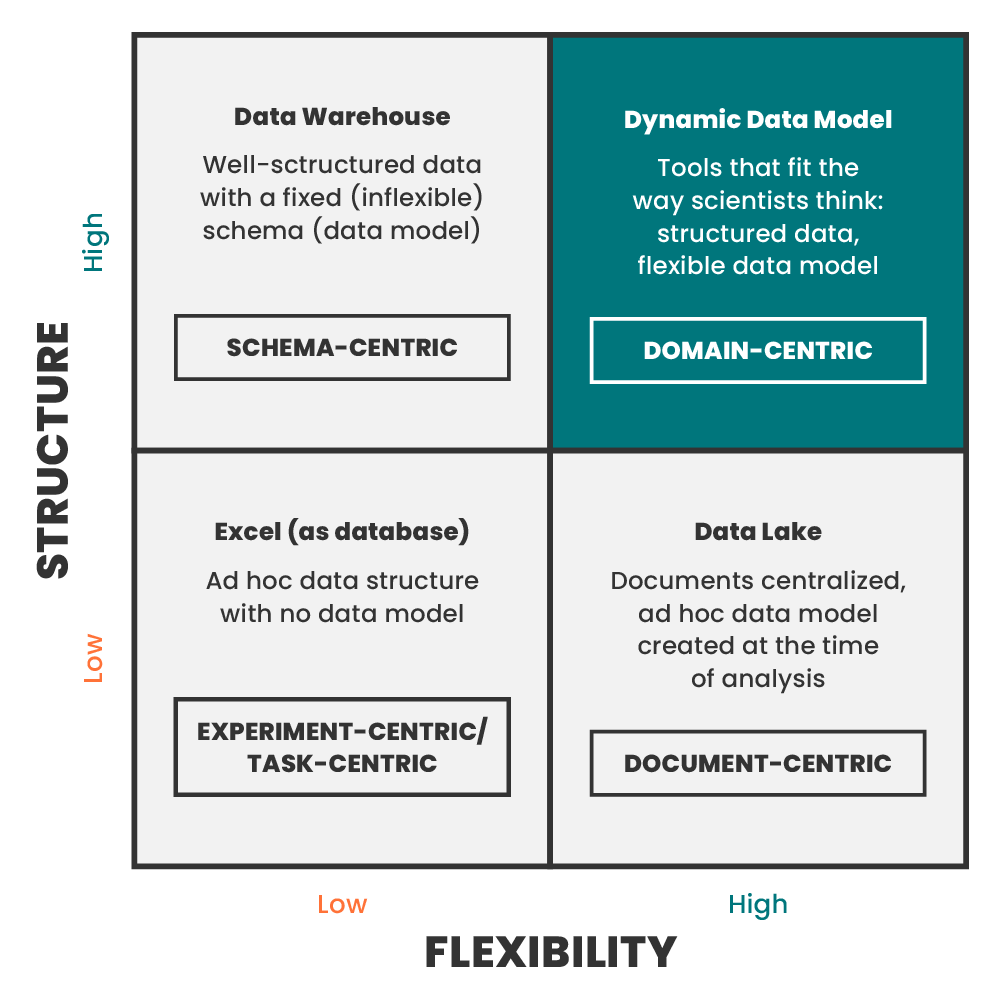Digital transformation is reshaping industries, demanding scientific organizations to adapt and remain competitive in the rapidly changing landscape. Data lies at the heart of this transformation, providing the foundation for strategic decision-making and innovative breakthroughs. To achieve sustained success and outpace the competition, visionary leaders understand the need to not only keep pace with digital advancements but to stay ahead through continuous innovation and adaptation.
One area that offers significant potential for unlocking value is research and development (R&D). Scientific data, which underpins every digital strategy, often holds untapped insights and opportunities. By streamlining data collection, management, and access, organizations can realize immediate business value while establishing a strong foundation for future innovation.
Scientific data requires specialized handling due to its unique characteristics.
Consider the following challenges:
- Unstructured Nature: Scientific data takes diverse forms, such as images, graphs, spectra, and genetic sequences. Extracting meaningful insights from this unstructured data demands specialized tools and expertise tailored for scientific use cases.
- Complex Data Handling: Scientific data is often stored in binary file formats, making it challenging to extract, centralize, and combine datasets. Traditional methods struggle to efficiently process and integrate this data, hindering exploration and collaboration.
- Metadata and Context: Comprehensive metadata, including experimental conditions, variables, and contextual information, is vital for reproducibility, secondary analysis, and data validation. Capturing and storing this metadata is essential for extracting the full value of scientific data.
- Flexible Data Models: R&D involves iterative processes and hypothesis testing. To accommodate evolving ideas and hypotheses, data models must be flexible, enabling scientists to adapt and explore new possibilities effectively.
Dynamic data models are ideal for the complexities of scientific data.
Addressing these challenges requires purpose-built solutions that go beyond traditional data management tools. Data lakes offer flexibility but lack the necessary structure for efficient analysis. Data warehouses provide structure but restrict the rapid and iterative exploration required by scientists. Even widely used tools like Excel, while individually flexible, often result in data silos and hinder collaboration and discoverability.
 The ideal solution lies in providing structured data through a scientific domain-oriented API, tailored to fields like chemistry or biology, directly usable by scientists.
The ideal solution lies in providing structured data through a scientific domain-oriented API, tailored to fields like chemistry or biology, directly usable by scientists.
This approach embraces dynamic data models, enabling the flexibility required for discovery. Purpose-built tools for science expedite scientific workflows, establish a solid foundation for future innovation, and empower scientists to extract maximum value from their data.
When R&D organizations empower their scientists with efficient and effective tools to work with data, they unlock two levels of innovation: sustaining and disruptive. In the short term, optimized data utilization leads to improvements in R&D operations, including increased throughput, better reliability, reduced risk, cost savings, and accelerated time to value. These sustaining innovations enhance the value delivered by the business today.
Furthermore, by enabling scientists to easily explore ideas, next-generation product features, or new therapeutic modalities, organizations foster disruptive innovations that become major drivers of the business tomorrow. Providing scientists with accessible data and exploration tools empowers them to push boundaries, driving breakthroughs and market leadership.
Recognizing the unique value of R&D data and adopting purpose-built solutions tailored to scientific requirements, organizations can unlock the full potential of their data. By doing so, they position themselves at the forefront of innovation, driving continuous improvement and securing a competitive advantage in the digital era.
Have questions about how to level up your data strategy? Contact us to get connected with an expert today.
Related Content
Digital Transformation vs. Digital Enhancement: A Starting Decision Framework for Technology Initiatives in R&D
Leveraging advanced technology like generative AI through digital transformation (not digital enhancement) is how to get the biggest returns in scientific R&D.
Digital Transformation in Practice
There is much more to digital transformation than technology, and a holistic strategy is crucial for the journey.
Leveraging AI for More Efficient Research in BioPharma
In the rapidly-evolving landscape of drug discovery and development, traditional approaches to R&D in biopharma are no longer sufficient. Artificial intelligence (AI) continues to be a...
Utilizing LLMs Today in Industrial Materials and Chemical R&D
Leveraging large language models (LLMs) in materials science and chemical R&D isn't just a speculative venture for some AI future. There are two primary use...
Top 10 AI Concepts Every Scientific R&D Leader Should Know
R&D leaders and scientists need a working understanding of key AI concepts so they can more effectively develop future-forward data strategies and lead the charge...
Why A Data Fabric is Essential for Modern R&D
Scattered and siloed data is one of the top challenges slowing down scientific discovery and innovation today. What every R&D organization needs is a data...
Jupyter AI Magics Are Not ✨Magic✨
It doesn’t take ✨magic✨ to integrate ChatGPT into your Jupyter workflow. Integrating ChatGPT into your Jupyter workflow doesn’t have to be magic. New tools are…
Top 5 Takeaways from the American Chemical Society (ACS) 2023 Fall Meeting: R&D Data, Generative AI and More
By Mike Heiber, Ph.D., Materials Informatics Manager Enthought, Materials Science Solutions The American Chemical Society (ACS) is a premier scientific organization with members all over…
Real Scientists Make Their Own Tools
There’s a long history of scientists who built new tools to enable their discoveries. Tycho Brahe built a quadrant that allowed him to observe the…
How IT Contributes to Successful Science
With the increasing importance of AI and machine learning in science and engineering, it is critical that the leadership of R&D and IT groups at...